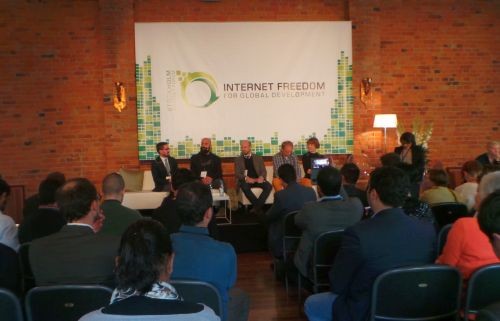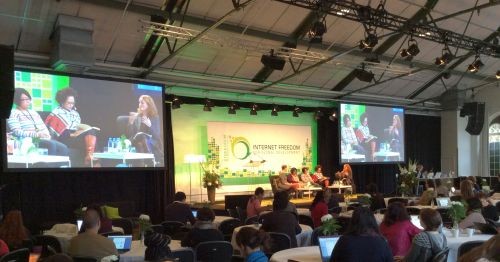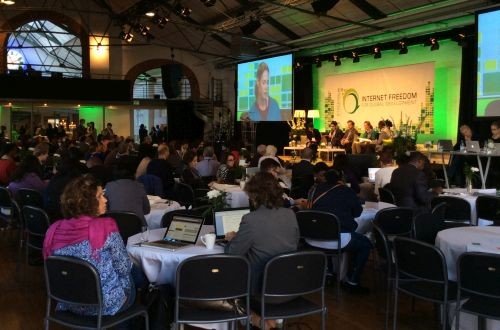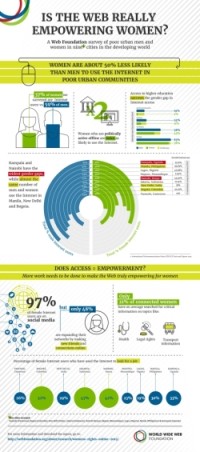Gender inequality was discussed in Stockholm Internet Forum organized in Sweden's capital Stockholm between the dates of October 19-22 with the participation of over 400 participants. IPS Communication Foundation/bianet along with journalists Gökhan Biçici and Burcu Karakaş and academics Associate Prof. Dr. Kerem Altıparmak and Prof. Dr. Yaman Akdeniz joined the forum from Turkey.
Before the Internet Forum organized 4th time by Swedish International Development Cooperation Agency (SIDA), participants gathering from the Middle East and North Africa discussed the national and regional obstacles before access to Internet on the ground of language and gender in the first preliminary meeting held on October 19-20.
In the second day which consists of five atelier sessions, strengthening education structures for women, purchasing power, status of informatics companies and international democratic society groups in terms of their capacity to have an effect on decision mechanisms regarding content accessed and regulating Internet traffic in different countries. In the atelier titled "Gendered Access Around the World", gender asymmetry on Internet was conveyed via human stories compiled in cooperation with NewZambian, Asikana Network, GRACE Network, WOUGNET and Sweden Lusaka Embassy.
Opening speeches were made by SIDA General Director Charlotte Petri Gornitzka and Swedish Foreign Ministry Development Cooperation Responsible Ulrika Modéer. In the first day of the forum, it was emphasized in various sessions that it would be a narrow-minded approach to reduce all issues regarding Internet to accessibility as in reducing accessibility issue to woman using cell phone. It was stated that competition capacity is the most important factor of Internet access in global digital economy.
Jellema: Internet revolution yet to be completed
World Wide Web Foundation (WWWF) Chair of the Board, Anne Jellema, speaking a the session titled "All the Internet All of the Time" noting that Internet access costs vary dramatically on global level, expressed that limitations that emerge in sub-structure, purchasing power and different social/cultural contexts should be monitored with a multi-dimensional approach:
"Printing press revolution had decreased average price of a book by 300 times, and ensured information be spread faster and and cheaper than ever before. Industrial Revolution had occurred by means of a similar revolution. However, I don't think Internet revolution is yet to be completed. Today in Japan ultra fast Internet, access to unlimited Internet is less than 1 percent of income per capita whereas in Mozambique 6 mb Internet and access to limited Internet is more than half of income per capita."
Solomon: Cross borders cooperation is necessary

In the session in which Wojtek Bogusz (Frontline Defenders), Brett Solomon (Access Now), Marcin de Kaminski (SIDA), Sanne Stevens (Hivos People Unlimited) and Ali Karimzadeh Bangi (ASL19) took part as debaters, Internet security issue of human rights defenders was tackled and monitoring Internet activities of rights defenders and drawn attention to increase in online attacks against civil society. Solomon highlighted the importance of cross borders information and experience sharing: "Now the issues of what kind of Internet the 4 billion people, who don't have access to Internet, will enter depends on whether the cooperation of positive actors in states and tech. companies will produce results. A militarized Internet with a wide-spread censor and constant surveillance, or an Internet with open code, safe and free?"

In the last day of the conference, Dr. Maja Fjaestad (Swedish Ministry of Strategic Development and Northern Countries Cooperation), Nighat Dad (Digital Rights Foundation), Jan Moolman (Project Coordinator of Women's Rights Program-Association for Progressive Communications), Liza Garcia (Foundation for Media) discussed sexist violence on Internet.
Speakers stated that online violence and threats by intertwining with each other dramatically affect the contribution of women/girls/LGBTI individuals in forming online content and public visibility. It was also stated that not only victims but also police and courts are ill-informed about what to do as to the sexist violence exposed on Internet, and especially feminist organizations should be more active in this area and mobilize information networks.
Both days were completed by parallel sessions and atelier works designed by participants. Some of the sessions were as follows:
* How We Use the Internet to Mobilise the Queer Movement in Iraq?
* Syria's freedom of expression ecosystem
* How can whistleblowers and sources of journalism be protected in the Digital era?
* Debating Religion in Cyberspace
* How Women in Conservative Societies Can Use the Internet to Empower Themselves?
* Internet freedom & digital safety for Iranian civil society
Click here for Stockholm Internet Forum 2015. (EG/TK)
Click here to read the article in Turkish





